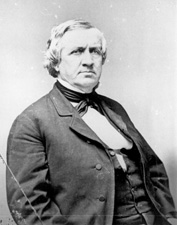
John Parker Hale (1806-1873)
John Parker Hale (March 31, 1806 - November 19, 1873) was born in Rochester, Strafford County, New Hampshire. He father died when Hale was thirteen, and his mother moved the surviving children to Maine. She scraped up enough money to send Hale to Phillips Exeter Academy and Bowdoin College in 1827. Hale then studied the law and became a lawyer.
He became a member of the New Hampshire state House of Representatives in 1832 and served as U.S. District Attorney for New Hampshire, 1834-41.
He was elected a U.S. Representative from New Hampshire, as a Democrat, to the 28th Congress, serving from March 4, 1843 to March 3, 1845. He quickly established himself as a leading antislavery member. Hale opposed Texas annexation and the gag rule, and for those acts of apostasy from Democratic orthodoxy, he was purged from the ticket for re-election. He was later elected as a Free Soil candidate to the United States Senate in 1846 and served from March 4, 1847, to March 3, 1853
In January 1848 the Liberty Party nominated Hale at its convention in New York City. Before the national election was held, however, Hale withdrew from the race, and the Liberty Party dissolved when many of its members joined "Barnburner" Democrats and "Conscience" Whigs in forming the Free-Soil Party on August 9, 1848. Led by Salmon P. Chase and John P. Hale, free-soilers, abolitionists, and others convened in Buffalo, N.Y., in August 1848 to set up a broadly based party. Among those present were discontented New York Democrats known as "Barnburners," headed by former President Martin Van Buren, who became the convention's presidential nominee. Van Buren polled 291,616 votes in November and the Free Soil party elected nine congressmen.
Senator Hale succeeded in getting a law passed in September 1850 abolishing flogging in the Navy and merchant marine.
Hale was one of the few senators (along with Charles Sumner, Salmon Chase and Benjamin Wade) who voted against the Fugitive Slave Act of 1850.
Hale was an unsuccessful candidate for President of the United States on the Free Soil ticket in 1852. He attracted 156,000 votes, a lower vote total than Van Buren's in 1848. (By 1854 the Free Soilers had been incorporated into what would become the Republican Party).
He was again elected to the Senate in 1855 to fill the vacancy caused by the death of Charles G. Atherton. He was re-elected in 1859, in total serving from July 30, 1855, to March 3, 1865. He served as the chair of the Senate Republican Conference until 1862. He was accused of questionable practices as chairman of the Naval Committee. It was alleged that a number of New England politicians and congressmen, among them the vice president and the chairman of the Senate Naval Committee on Naval Affairs, John P. Hale, had profiteering on useless hulks that they were foisting off on the government. Hale was defeated (1864) for reelection.
His daughter Lucy Hale was betrothed to John Wilkes Booth, who had a photograph on his person when he was killed. Lucy and Booth had been secretly engaged a month before the assassination. Some say it was she who invited Booth to attend Lincoln's second inauguration, after which Booth reportedly told his co-conspirators, "What an excellent chance I had to kill him then."
He was minister to Spain (1865-69).
He died in Dover, Strafford County, N.H., on November 19, 1873, and is buried at Pine Hill Cemetery, Dover, N.H. A statue of John P. Hale stands outside of the State House in Concord, New Hampshire.